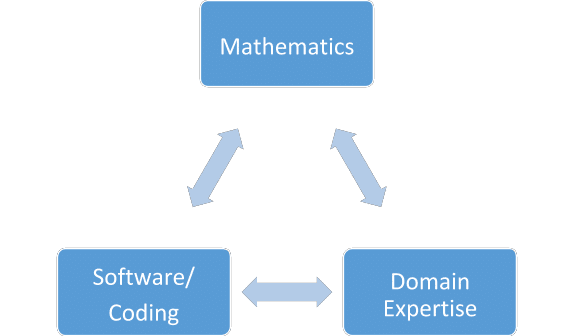A Guide to Hiring Data Scientists
- by 7wData

data science is an emerging field, and roles, as well as qualifications, aren’t clear-cut at the moment. Given the murkiness surrounding the field and the potential lack of analytics expertise at companies seeking to hire a data scientist or team of data scientists, the task of building an analytics team or hiring a company’s first data scientist can be daunting. However, with a brief overview of data scientist types and example questions to assess each type, hiring managers can provide recruiters with a more tailored profile and better assess candidates on skills likely needed to fill the role.
Data scientists typically have skills in 3 main areas: mathematics/statistics/machine learning, coding/software engineering, and expertise in the industry in which they seek employment (see chart below). Most mature data scientists have a strong skills in 2 of these 3 areas, yielding software/math folks (who are typically found in tech companies or production roles), math/domain folks (more of a traditional statistician or scientific researcher), or software/domain (less common but often involved in data pipelines and business intelligence roles). Someone with strong skills in all 3 areas are the so-called “unicorns,” and they are typically late career folks or consultants by the time they develop expertise in all 3 areas. In addition to these skills, a solid data science candidate should have knowledge of scientific research processes and solid communication skills to turn results into possible business solutions.
Hiring the right candidate for the role he/she will play within the company can be simplified by pigeonholing the role as 1 of the 3 mature data scientist types, and subsequent job descriptions/interview questions can be tailored to that type of role. By pairing 2 or 3 data scientists with complimentary skills, one can build an effective data science team without needing a large budget.
Math/software strengths (Type 1) are common in tech companies or positions in which new algorithms or data frameworks can be productionalized without respect to nuances of the industry, data types, or regulations of the industry (such as those in education, healthcare, finance, and biotech/pharma). These folks might create a new version of PageRank, develop a new app for the company, or productionalize new algorithms and BI findings. Skills include a mix of several programming languages (Python, R, maybe even C++ or Java), big data frameworks (Hadoop, Spark, NoSQL…), algorithm design and software development (computer science coursework or degree, agile/waterfall software lifecycles), and some advanced training in mathematics or machine learning (possibly a degree in this field). Education-wise, Type 1 data scientists most likely to enter data science with a Bachelor’s or Master’s degree, likely focused on computer science or software engineering.
Questions to assess a Type 1 candidate might touch upon distributed computing frameworks (steps of MapReduce for algorithm design, knowing which algorithms work well in distributed computing), database design (relational vs. non-relational vs. Neo4j, real-time capture and deployment of models, automated table updates), creation of analytics pipelines (particularly in Python these days), and depth of machine learning knowledge (mathematical concepts used to create a random forest model, mathematical differences and implementation considerations of random forest vs. boosted regression, knowledge of differences between deep learning frameworks…).
[Social9_Share class=”s9-widget-wrapper”]
Upcoming Events
From Text to Value: Pairing Text Analytics and Generative AI
21 May 2024
5 PM CET – 6 PM CET
Read More


